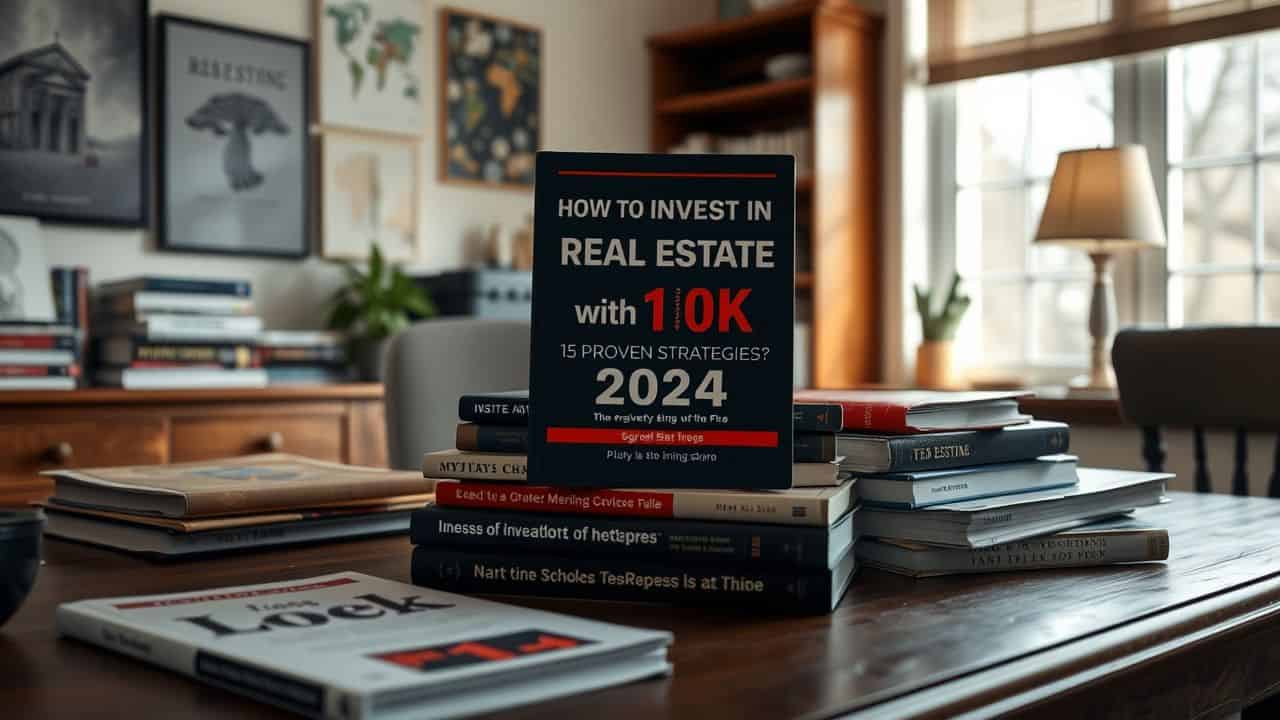Got $10,000 and dreams of real estate riches? You’re not alone. Many folks want to invest in property but think it’s out of reach. Good news: you can start with just 10K. This guide will show you 15 smart ways to invest in real estate with 10K in 2024.
Ready to turn that cash into a property goldmine? Let’s go!
Key Takeaways
Real estate investing with $10K is possible through strategies like crowdfunding, REITs, and fractional ownership. Platforms like Fundrise let you start with as little as $10.
First-position mortgage liens offer a safe 5.5% average yearly return. Tax liens can yield 10-12% interest rates but require careful research.
House flipping clubs earned $67,900 per flip on average in 2022. The BRRRR method (Buy, Rehab, Rent, Refinance, Repeat) helps investors grow their portfolio efficiently.
House hacking by living in one unit of a multi-family property and renting out others can significantly reduce housing costs for new investors.
Analyzing market conditions is crucial. Factors to consider include job growth, income levels, vacancy rates, and local development plans to make informed investment decisions.
Table of Contents
Basics of Small-Scale Real Estate Investments

Small-scale real estate investments can be a smart way to grow your money. Here, realtors in Lincoln, NE point out that you don’t need millions to start. With $10,000, you can dip your toes into the property market. Think of it like planting a money tree – it takes time, but it can bear fruit.
One way to start is through fractional ownership. This lets you own a piece of a bigger property. It’s like splitting a pizza with friends, but with buildings instead of cheese.
Another option is real estate crowdfunding. It’s similar to how people raise money online for causes, but for property deals. You chip in with others to fund a project. REITs are also worth looking at.
They’re like mutual funds, but for real estate. You buy shares in a company that owns and manages properties. It’s a hands-off way to invest in real estate without dealing with tenants or toilets.
Real estate cannot be lost or stolen, nor can it be carried away. Purchased with common sense, paid for in full, and managed with reasonable care, it is about the safest investment in the world. – Franklin D. Roosevelt
Effective Strategies to Invest $10K in Real Estate

Ready to jump into real estate with just $10K? You’re in luck! We’ve got some killer strategies that’ll make your money work harder than a dog chasing its tail. From first-position mortgage liens to crowdfunding, there’s a whole buffet of options waiting for you to dig in.
Investing in First-Position Mortgage Liens
First-position mortgage liens are a good way to start in real estate. These loans are first in line for repayment, which makes them safer. Concreit, a popular platform, offers a 5.5% average yearly return on these investments.
That’s pretty good for guys who want to grow their money without worry.
I’ve invested in these liens myself, and it’s been going well. You don’t have to handle tenants or fix plumbing issues. The regular income is great, and it’s reassuring to know your investment is secured by actual property.
Keep in mind, while the returns might not be as high as some other options, the lower risk can be a big advantage for many investors.
Exploring Tax Liens for Potential Returns
Tax liens can be a goldmine for smart investors. These liens appear when property owners don’t pay their taxes. The government sells them to get the money back. Here’s the cool part: you can grab these liens and earn some great returns.
We’re talking about 10% to 12% interest rates. That’s serious money!
I’ve tried tax liens myself, and wow, it’s surprising. You gotta do your research, but the reward can be big. It’s like finding a $20 bill in your old jeans – but way better. Just keep in mind, it’s not always easy.
You might end up owning the property if the owner doesn’t pay. But hey, that could be good too! Always check local laws and maybe talk to an expert before you start.
Engaging in Real Estate Crowdfunding
Real estate crowdfunding is a game-changer for guys looking to dip their toes into property investing. It’s like joining forces with other investors to buy a slice of the real estate pie.
Platforms like Fundrise make it easy to get started, even if you’re not rolling in dough. You can pool your cash with others and invest in bigger projects that were once out of reach.
Here’s the kicker – you don’t need to be a big shot to play. Thanks to new rules, both accredited and regular Joes can join in. The best part? You could see returns of 7% to 9%. That’s not chump change! It’s a smart way to spread your risk and potentially earn more than your average savings account.
Real estate crowdfunding is democratizing property investment, one dollar at a time.
Starting with Real Estate Wholesaling

Real estate wholesaling can be a great way to start investing with just $10K. It’s about finding good deals and passing them on to other investors for a fee. You’ll need sharp negotiation skills and solid marketing abilities to succeed.
But be careful – many people struggle to make money in this area due to market saturation.
To get started, you’ll want to use some helpful calculators. These tools help you figure out if a deal’s worth your time. You’ll calculate repair costs, after-repair value, and potential profit margins.
It’s not complicated, but it does take practice. Your success depends on spotting great opportunities before anyone else does.
Trying Fractional Real Estate Investing

Moving from wholesaling, let’s explore another exciting option: fractional real estate investing. This approach lets you own a slice of property without breaking the bank. It’s like buying a piece of pizza instead of the whole pie.
Fractional investing opens doors to high-value properties you couldn’t afford alone. Platforms like Fundrise make it easy, with just $10 to start. You can spread your cash across different properties, lowering your risk.
Plus, you don’t have to deal with tenants or repairs. The tech behind it is smart, handling buying, selling, and managing your shares. It’s a cool way to dip your toes into real estate without diving in headfirst.
Insights into Real Estate Investment Trusts (REITs)

REITs offer a way to dip your toes into real estate without buying property. They’re like mutual funds, but for buildings – you can buy shares and earn money from rent and property sales.
Investing in Publicly Traded REITs
Publicly traded REITs offer an easy way to get into real estate. These companies own and manage income-producing properties. You can buy shares through a brokerage account, just like stocks.
The best part? They must give out 90% of their taxable income as dividends each year. That’s why REITs have beaten the S&P 500 over time. From 1972 to 2019, they returned 11.8% annually, while the S&P 500 only managed 10.6%.
Some REITs have done even better lately. Take SL Green Realty Corp. It raked in a whopping 173.08% total return in just one year, as of November 2024. That’s huge! But keep in mind, past performance doesn’t guarantee future results.
Still, if you want to try real estate without buying a whole building, publicly traded REITs could be a good option for you.
Choosing Real Estate Mutual Funds
Moving from publicly traded REITs, let’s explore real estate mutual funds. These funds offer a way to dip your toes into property markets without buying actual buildings. They invest in REITs and real estate stocks, giving you a slice of the property pie.
A pro manages your money, picking the best spots to invest.
Real estate mutual funds react to big economic shifts. Things like how much people are spending or the country’s growth can shake them up. But don’t let that scare you off. These funds let regular folks like us join the real estate game without breaking the bank.
It’s like having a tiny piece of many properties in your pocket.
Real estate mutual funds are the everyman’s ticket to property investing – no hard hat required!
Innovative Options for Real Estate Investments
Real estate isn’t just about buying houses. There are cool new ways to make money in property – and they’re easier than you’d think.
Joining a House-Flipping Club
House-flipping clubs are getting popular. These groups combine money and expertise to buy, renovate, and sell your home for top dollar.
You can join with $10K. In 2022, flippers earned about $67,900 per home – that’s a 26.9% return! But don’t expect quick riches. Most flips take four to six months to finish. Still, it’s a good way to learn and earn some cash.
Joining a club reduces risk and speeds up your learning. You’ll work with experts who know the process. Plus, you’ll see firsthand how to choose properties, plan for repairs, and price for profit.
Just keep in mind – flipping isn’t always easy. Market changes can reduce profits. But with 8.4% of all U.S. home sales being flips in 2022, there’s clearly money to be made.
Becoming a Limited Partner in Real Estate Deals
Limited partnerships in real estate can be a smart move for guys with $10K to invest. You chip in cash, but don’t have to deal with day-to-day hassles. The general partner handles all that stuff.
Your job? Sit back and watch your money grow. But heads up – market ups and downs can affect your returns. It’s not all smooth sailing.
Here’s a cool fact: real estate syndications need less net worth than index funds to make $60K yearly. That’s good news if you’re just starting out. Plus, you get to learn from pros who know things real estate agents need to succeed.
Ready to dive deeper? Let’s talk about using tech to boost your real estate game.
Converting Your Home into an Airbnb
Turning your home into an Airbnb can be a smart move. It’s a flexible way to make extra cash without buying new property. But hold on – you need to check local rules first. Some cities have strict laws about short-term rentals.
Don’t get caught off guard!
Once you’re in the clear, pick your market wisely. Look for areas where tourists flock and housing is still cheap. This combo can lead to big profits. I’ve seen friends rake in serious dough by renting out spare rooms.
One guy even paid off his student loans in just two years! It’s not always smooth sailing, though. Be ready for late-night calls and picky guests. But if you can handle that, Airbnb might be your ticket to passive income heaven.
Leveraging Technology for Real Estate Investments

Tech’s changing the real estate game big time. Smart apps and online platforms make investing easier than ever. Want to know how? Keep reading!
Exploring Smart Real Estate Syndications
Smart real estate syndications offer a cool way to get into property investing. You team up with other folks to buy bigger, pricier assets. It’s like a group of friends chipping in for a pizza, but way more profitable! The best part? You can start with just $10k.
Spread that cash across different deals, and you’re set.
Here’s the cool thing: if you keep putting in $10k each year, you could be rolling in dough. By year 24, you might see over $60k in yearly cash flow. And if you stick with it for 40 years? Your net worth could hit a whopping $3.85 million.
Pretty awesome for a small investment, right? Just keep in mind, like any investment, there are risks. But with smart choices, real estate syndications can be a total game-changer for your wallet.
Using Platforms for Fractional Ownership
Fractional ownership platforms are changing the game for small-time real estate investors. These online tools let you buy a slice of property for as little as $10. It’s like owning a piece of the pie without buying the whole bakery.
Fundrise, Arrived, and Lofty are some top dogs in this space. They make it easy to dip your toes into real estate without drowning in debt.
I’ve tried these platforms myself, and let me tell you – it’s pretty slick. You can spread your cash across different properties, cutting down your risk. Plus, you don’t have to deal with tenants or toilets.
The platforms handle all that messy stuff. Next up, let’s chat about how to make your real estate investments work harder for you with the BRRRR method.
Cost-Effective Methods for Real Estate Investing

Want to save money in real estate? Try these clever strategies… They’ll help you make the most of your budget and increase your earnings. Keep reading to find out how!
Applying the BRRRR Method
The BRRRR method is a smart way to grow your real estate empire. It stands for Buy, Rehab, Rent, Refinance, Repeat. First, you snag a cheap property that needs some love. Fix it up, then find tenants to pay you rent.
Once it’s making money, refinance to pull out your cash. Now you’re ready to do it all over again! This trick lets you keep adding to your portfolio without burning through all your funds.
Here’s a pro tip: aim for the 1% rule when setting rent. That means charging at least 1% of your total investment each month. So, if you put $100,000 into a place, try to get $1,000 in rent.
This helps cover your costs and puts cash in your pocket. Plus, when you refinance, you can often get back your initial $10K… and then some! It’s like magic – your money works for you, then comes right back home.
Adopting the House Hacking Strategy
House hacking is a smart way to live for free and build wealth. You buy a multi-family home, live in one unit, and rent out the others. This cuts your housing costs and gives you rental income.
It’s perfect for first-time buyers who want to start investing in real estate.
I tried house hacking with a duplex last year. It was a game-changer! My tenants’ rent covered most of my mortgage. I saved tons of cash each month. Plus, I learned how to be a landlord…
hands-on experience that’s worth its weight in gold. If you’re ready to dive in, look for duplexes or triplexes in up-and-coming areas. They’re ideal for this strategy.
Evaluating Your Real Estate Investment

Sizing up your real estate deal? It’s like checking the engine before a road trip. You gotta look at the risks, returns, and what’s cooking in the market. Want to know more about making smart moves with your $10K? Keep reading!
Assessing Risks and Returns
Real estate investing isn’t all sunshine and rainbows. You gotta weigh the good with the bad. Let’s break down the risks and returns you might face:
| Risks | Returns |
|---|---|
– Market crashes – Tenant problems – Unexpected repairs – Interest rate hikes – Property value drops | – Steady rental income – Property value growth – Tax benefits – Inflation hedge – Leverage advantages |
Smart guys don’t put all their eggs in one basket. Spread your cash across different properties or investment types. Look into things before jumping in. Check out the neighborhood, crunch the numbers, and get a pro’s opinion.
Property upgrades can boost your returns. A fresh coat of paint or energy-saving gadgets might attract better tenants or bump up your asking price. But don’t go overboard – some fixes cost more than they’re worth.
Keep an eye on the market. What’s hot today might be cold tomorrow. Stay flexible and ready to pivot if things change. And keep in mind, real estate’s a long game. Don’t expect to get rich overnight.
Analyzing Market Conditions
Analyzing market conditions is key to smart real estate investing. You need to know what’s happening in the area you’re eyeing. Let’s break it down.
| Factor | What to Look For | Why It Matters |
|---|---|---|
| Economic Indicators | – Job growth – Income levels – Population trends | Shows if an area is growing or shrinking. More jobs often mean more renters or buyers. |
| Supply and Demand | – New construction – Vacancy rates – Time on market | Helps predict if prices might go up or down. Too many empty homes? Prices might drop. |
| Rental Market | – Average rents – Occupancy rates – Tenant demographics | Crucial if you plan to rent out property. High rents and low vacancies are good signs. |
| Local Trends | – Upcoming developments – Zoning changes – Neighborhood gentrification | Can hint at future growth. A new mall or transit line might boost property values. |
I once bought a place without checking these factors. Big mistake! The area was declining, and I struggled to find tenants. Don’t be like me – do your homework.
Online databases are great sources for this info. But don’t stop there. Chat with local real estate pros. They often know stuff that hasn’t hit the stats yet.
Market conditions change. What’s hot today might cool tomorrow. Stay informed, and you’ll spot opportunities others miss.
People Also Ask
Can I really invest in real estate with just $10K?
You bet! While it might seem like peanuts compared to buying a whole apartment complex, $10K can open doors in real estate. Think outside the box. REITs, crowdfunding, or even tax lien certificates are options. It’s not always about owning bricks and mortar outright.
How do REITs compare to buying physical property?
REITs are like the smooth operators of real estate. They’re more liquid than physical property and trade on stock exchanges. You can start small and still get a slice of the real estate pie. Plus, they often offer better returns than traditional rental properties. But remember, you’re not the landlord here.
Is house hacking a viable strategy with $10K?
House hacking is the Swiss Army knife of real estate investing. With $10K, you could potentially cover closing costs on an FHA loan. Live in one part of a multi-unit property and rent out the rest. It’s like having your cake and eating it too. Just be ready to wear your landlord hat.
How risky is investing in real estate compared to stocks?
Real estate can be a rollercoaster, just like stocks. But it’s often a slower, less nauseating ride. Property values don’t swing wildly like stock prices. However, real estate is less liquid. You can’t sell a house with a mouse click. Consider your risk tolerance and need for quick cash before diving in.
Can I use my IRA to invest in real estate?
Absolutely! Your IRA can be your secret weapon in real estate investing. Both traditional and Roth IRAs allow for real estate investments. It’s not just about stocks and bonds. But tread carefully. There are rules to follow, and you’ll need a self-directed IRA. It’s not a walk in the park, but it can be rewarding.
Are there tax advantages to real estate investing?
You bet your bottom dollar there are! Real estate can be a tax haven. Think depreciation deductions, mortgage interest write-offs, and even tax-free profits if you live in the property for two years. But don’t get starry-eyed. Talk to a tax pro. They’ll help you navigate the maze of real estate tax benefits.
References
https://ark7.com/blog/learn/in-depth/real-estate-investing/how-to-invest-10k-in-real-estate-strategies-to-consider/ (2023-11-22)
https://www.bankrate.com/investing/how-to-invest-in-real-estate/
https://www.gatsbyinvestment.com/education-center/start-investing-real-estate-any-budget
https://www.gobankingrates.com/investing/strategy/10-percent-return-on-investment/
https://flippa.com/blog/radical-fire-how-to-turn-10k-into-100k-12-top-ways-to-do-it/
https://fastercapital.com/content/Real-estate–Net-Investment-Strategies-in-the-Lucrative-Real-Estate-Market.html (2024-06-24)
https://www.biggerpockets.com/forums/93/topics/1036775-wholesellers-stop-read-this-wholesaling-is (2022-04-29)
https://www.nerdwallet.com/article/investing/reit-investing
https://www.investopedia.com/articles/investing/040315/reits-versus-real-estate-mutual-funds.asp
https://paperfree.com/en/magazine/reits-real-estate-funds–real-estate-mutual-funds-the-comparison (2024-05-29)
https://www.investopedia.com/articles/mortgages-real-estate/08/house-flip.asp
https://listwithclever.com/real-estate-blog/5-ways-to-successfully-invest-10k-in-real-estate/ (2024-06-13)
https://www.biggerpockets.com/forums/530/topics/1198286-turning-a-primary-residence-into-an-airbnb
https://ismaelreyreyes.com/why-real-estate-syndications-are-a-smart-investment-choice-in-2024/ (2024-01-30)
https://www.linkedin.com/pulse/leveraging-technology-real-estate-investing-guide-single-davis-ybjhe
https://newsilver.com/the-lender/fractional-real-estate-investing/ (2024-01-29)
https://www.baselane.com/resources/brrrr-method-for-real-estate/
https://callporter.com/blog/real-estate-investing-strategies/ (2024-03-27)
https://realatlas.com/co/start-investing-in-real-estate-by-house-hacking/
https://gallaghermohan.com/blogs/real-estate-investing-assessing-risks-and-maximizing-returns/

